|
De Estische dichter, schrijver en vertaler Tõnu Õnnepalu werd geboren op 13 september 1962 in Tallin. Zie ook mijn blog van 13 september 2010 en eveneens alle tags voor Tõnu Õnnepalu op dit blog.
Quelque part à un tournant du destin
Quelque part à un tournant du destin
les mains de Dieu sont pleines
de tulipes et de narcisses
cireux charnus rebelles
qui se balancent dans le vent du Nord-Ouest.
Mon âme deviendra-t-elle la fumure
sur laquelle poussera quelque chose de neuf
de moins incertain
de moins instable
qui serait comme un arbre à sept branches ?
Ou bien se noiera-t-elle un jour
semblable à aujourd’hui
dans ce lac
où dérive la Terre
dans ce regard là-haut
dans cet œil bleu et froid de prophète ?
1er SEPTEMBRE 1986
À la radio, on parle du début de la deuxième guerre mondiale. Nous sommes assis autour de la table de la cuisine. Nous nettoyons des groseilles. À Berlin, les cache-fenêtres étaient prêts depuis longtemps. La radio grésille. Aux armes citoyens ! Nous avons voyagé dans le coin d’un wagon de marchandises. À la frontière, on nous a fait sortir. Vraiment, comme il est drôle d’être vivant. Les groseilles rouges brillent à la lumière de la lampe. L’été a été chaud et ensoleillé. Les groseilles sont très sucrées cette année, et celles-ci sont déjà bien mûres. Mais les écraser contre le palais procure un plaisir acide. La Pologne était très fière de sa cavalerie. J’imagine des chevaux blancs, seulement des chevaux blancs. Ça devrait suffire pour le sucre. Tjomnaïa notch, tolko pouli svistjat po stepi. La radio estonienne s’entend mal ici. Je tourne le bouton. Polonais, letton, russe, finnois. L’Estonie, c’est ici. Et aussi à l’est, au delà de la mer. À l’ouest, de l’autre côté, c’est la Suède, et l’île de Farö où habite Ingmar Bergman. Sur l’île d’Åland, il y a des villas où l’on écoute peut-être la même musique en ce moment. Ce craquement me dérange. J’éteins la radio. Les papillons de nuit se cognent contre la vitre. L’ampoule de cent watts dans la cuisine les attire de loin. La nuit est si chaude aujourd’hui, si douce, si paisible. Tout est calme dans les grands arbres. Calme dans les champs obscurs.
Vertaald door Antoine Chalvin met hulp van de auteur
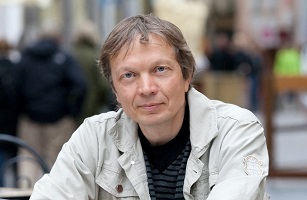
Tõnu Õnnepalu (Tallin, 13 september 1962)
De Poolse schrijver Janusz Glowacki werd geboren op 13 september 1938 in Poznań. Zie ook mijn blog van 13 september 2010 en eveneens alle tags voor Janusz Glowacki op dit blog.
Uit: The Last Supper (Vertaald door Zuza Glowacka)
“In the Texas desert he had built an enormous castle, put together fi sometimes bigger, some- times smaller pieces of famous buildings and monuments of architecture.
J.J.C moved in there only with his mother, his wife Sonia, several thousand servants, and a division of bodyguards.
And so, last Thursday, the entire world held its breath. Instead of the NY Knicks, LA Lakers game and ‘60 Minutes’ on the Russian mafia, every television station broadcast the sudden and unexpected death of a genius. The great designer was lying in his six-meter long canopy bed, which he had designed personally in June 2005, dressed for the occasion in his legendary Byzantine golden pajamas. Above his face, which had been prepared by the master of make-up, Salvador Bellini, who had been immediately flown in from Rome, hung hundreds of cameras and a forest of microphones.
Two billion people on five continents awaited the final words of a genius. Amid the intense silence, all that could be heard were the sobs of Steven Harrison, his long time chief bodyguard, who watched helplessly as J.J.C. tried six times with his trembling hand to bring a forkful of his favorite dish - Hungarian gulash - to his lips. At the sixth attempt, the hand of the great old man dropped and the round ball of red meat tumbled across the snowy white carpet, which was Caine’s invention and was a combination of pure silk, Afghani wool, and Moroccan cashmere. After that, his weakening lips whispered something that some understood as ‘fuck’ and others as ‘God bless America’, and the greatest genius of our time closed his eyes forever.
After the funeral ceremonies, which continued for several days, the cremating of the great man’s body and the scattering of his ashes - in accordance with his will - across the Texan desert, a series of unexplained catastrophes occurred. Caine’s jet airliners, in which the mourners were leaving the castle, exploded one after another. The perpetrators were never found. At first Islamic fundamentalists were suspected, but no groups admitted to the attacks. Colonel Gaddafi, deeply offended by the accusations, reminded reporters that all of his evening attire, just like Saddam Hussein’s uniform and Milosevic’s blue suit, had been designed by J.J.C.»
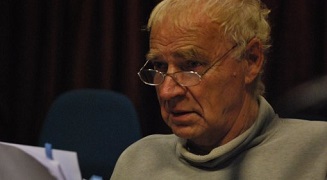
Janusz Glowacki (Poznań, 13 september 1938)
De Poolse dichter Julian Tuwim werd geboren in Łódź op 13 september 1894. Zie ook mijn blog van 13 september 2010 en eveneens alle tags voor Julian Tuwim op dit blog.
The Two Winds
One wind—in the field he blew,
Another wind—in the garden grew:
Quietly and very lightly
He caressed the leaves and rustled,
Swooned...
One wind—a mighty swell,
Somersaulted, flatly fell,
Leaped, and surged, soared up high,
Upwards whirled into the sky,
Overturned and dropped pell mell
Upon a soughing, drowsy garden,
Where so quietly and lightly
Now caressed the leaves and rustled
The other wind.
Off the cherry blossoms flew,
Laughter spread throughout the garden,
Brother took his twin for friend,
Now they cruise over the land
Chasing clouds and birds in flight,
Rush into the windmill’s stance,
And confuse its stupid arms,
Right and left they whistle, dance,
Blow their lungs with all their might,
Clowning in a frenzied riot!
The garden is so quiet... quiet...
Vertaald door A Giloe
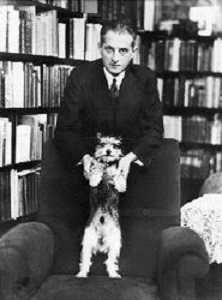
Julian Tuwim (13 september 1894 – 27 december 1953)
In 1950
De Nederlandse dichter, predikant en hoogleraarr Nicolaas Beets werd geboren op 13 september 1814 in Haarlem. Zie ook mijn blog van 13 september 2010 en eveneens alle tags voor Nicolaas Beets op dit blog.
Uit: Camera Obscura
“Met november komt het vuurtje, komen de tochtlatten met schapevacht, de lange avonden, de morsige straten, en de onstichtelijke koude in de grote kerken, met en benevens alle soorten van overklederen. Dan volgt december, met de boa`s en de moffen, en de almanakken (morgenrood en avondschemering, in onderlinge wedstrijd) en de Sint-Nicolaas, als het altijd te slecht weer is om uit te gaan, met een onverwachte sneeuwbui, die op één dag twintig nieuwe dameshoeden bederft, en de kleine nachtvorsten die doen rillen, niet van koude, maar van schrik. Het heilig kerstfeest, op het land zo liefelijk, zo eerbiedig gevierd, en zich zo harmonisch aansluitende aan de vredige stilte, die het voorgaat en opvolgt, geeft in de stad het teken voor drukte en gewoel en feestgejuich van allerlei aard; en na de ijselijke nieuwjaarsdag, waarop honderden verkouden worden, wordt een eerlijk huisvader overstroomd van concertprogramma's, die hem met een benepen hart de hoofden zijner op uitgaan beluste dochters tellen doen; en er is een onafgebroken spreken en handelen in de stad over danspartijen en comedies en soirées littéraires, en soirées musicales, en andere soirées, die noch het een noch het ander zijn, maar uiterst stijf en vervelend en akelig; en men verzadigd zich zo over en te over aan de wintervermaken, dat men er in vier weken genoeg van heeft. En onderwijl regeren de koude en de armoede, het ijs in de grachten, en de bedelarij op de sluizen. En nog twee volle maanden kijkt men mismoedig elke morgen op de thermometer, en telt men morrende het aantal `wintertjes' op. En eer men de neus buiten de poort steekt, moet er groen aan de bomen wezen; en eer men tevreden is over zijn kleine wandeling, moet het tenminste mei zijn. Dat is dus een winter van half oktober tot de meimaand toe. En dan heeft de steeman die buiten komt een gevoel alsof er een plotsellinge, een eensklapse verandering van decoratie gekomen is; want hij heeft niets van al die opwekkende toebereidselen gezien, die de natuur maakt, noch haar op de onderhoudende weg harer stille vorderingen mogen gadeslaan. Hij heeft al de vreugde gemist, die de buitenman gesmaakt heeft, toen zijn eerste kip begon te leggen en zijn eerste sneeuwklokje bloeide op de naakte en harde grond. Hij heeft de ganzen niet zijn vertrekken, en de spreeuwen en de kievieten niet zien aankomen, noch ook, drie dagen voordat de wind zuiëlijken zou. Die een Buiten heeft, en genoodzaakt of verstandig genoeg is er `s winters te blijven, staat des morgens met de zon op. Dat valt dan, wat de tijd betreft, nog al gemakkelijk, want ook de zon zelf is in dat jaargetijde niet zeer matineus.”
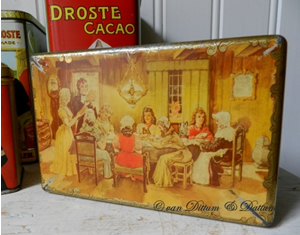
Nicolaas Beets (13 september 1814 – 13 maart 1903)
Bakkersblik met afbeeldingen uit de Camera Obscura
De Britse schrijver Roald Dahl werd geboren op 13 september 1916 in Llandalf, Zuid-Wales. Zie ook mijn blog van 13 september 2010 en eveneens alle tags voor Roald Dahl op dit blog.
Uit: The Magic Finger
« It jumps out and touches the person who has made me cross . ..
And after that the Magic Finger is upon him or her, and things begin to happen . . .
Well, the Magic Finger was now upon the whole of the Gregg family, and there was no taking it off again.
I ran home and waited for things to happen.
They happened fast.
I shall now tell you what those things were. I got the whole story from Philip and William the next morning, after it was all over.
In the afternoon of the very same day that I put the Magic Finger on the Gregg family, Mr Gregg and Philip and William went out hunting once again. This time they were going after wild ducks, so they headed towards the lake.
In the first hour they got ten birds.
In the next hour they got another six.
'What a day!' cried Mr Gregg. This is the best yet!' He was beside himself with joy.”
Just then four more wild ducks flew over their heads. They were flying very low. They were easy to hit.
BANG! BANG! BANG! BANG! went the guns.
The ducks flew on.
'We missed!' said Mr Gregg. That's funny.'
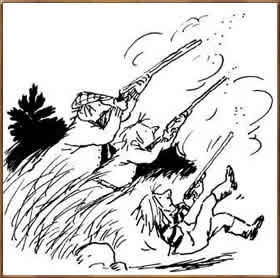
Roald Dahl (13 september 1916 – 23 november 1990)
Illustratie uit The Magic Finger
De Engelse dichter en toneelschrijver James Shirley werd geboren in Londen op 13 september 1596. Zie ook alle tags voor James Shirley op dit blog en ook mijn blog van 13 september 2010
The Garden
This Garden does not take my eyes,
Though here you show how art of men
Can purchase Nature at a price
Would stock old Paradise again.
These glories while you dote upon,
I envy not your spring nor pride,
Nay, boast the summer all your own,
My thoughts with less are satisified.
Give me a little plot of ground,
Where might I with the Sun agree,
Though every day he walk the round,
My Garden he should seldom see.
Those Tulips that such wealth display,
To court my eye, shall lose their name,
Though now they listen, as if they
Expected I should praise their name.
But I would see my self appear
Within the Violet's drooping head,
On which a melancholy tear
The discontented morn hath shed.
Within their buds let Roses sleep,
And virgin Lilies on their stem,
Till sighs from lovers glide, and creep
Into their leaves to open them.
I'th'center of my ground compose
Of Bays and Yew my summer room,
Which may so oft as I repose,
Present my arbor, and my tomb.
No woman here shall find me out,
Or if a chance do bring one hither,
I'll be secure, for round about
I'll moat it with my eyes' foul weather.
No bird shall live within my pale,
To charm me with their shames of art,
Unless some wandering Nightingale
Come here to sing and break her heart.
Upon whose death I'll try to write
An epitaph in some funeral stone,
So sad, and true, it may invite
My self to die, and prove mine own.
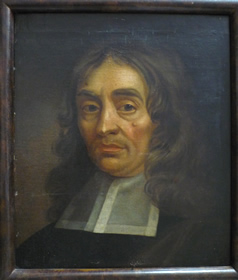
James Shirley (13 september 1596 – 29 oktober 1666)
Portret, National Portrait Gallery, rond 1645
Zie voor nog meer schrijvers van de 13e september ook mijn vorige blog van vandaag.
13-09-2014 om 14:41
geschreven door Romenu 
Tags:Tõnu Õnnepalu, Janusz Glowacki, Julian Tuwim, Nicolaas Beets, Roald Dahl, James Shirley, Romenu
|

